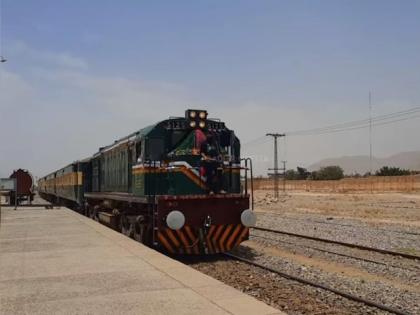Train Hijacking & Rivers of Blood
By Vijay Darda | Updated: March 17, 2025 08:05 IST2025-03-17T08:04:59+5:302025-03-17T08:05:55+5:30
When the British left, Balochistan was a free country for 227 days but Pakistan enslaved it

Train Hijacking & Rivers of Blood
The Baloch are a very brave community, Pakistani oppression can never weaken them.
I visited Pakistan as the chairman of South Asian Journalists Forum. There, I met some Baloch professors. One of them, a woman, was wearing beautiful jewellery. When I complimented it, she said, “Our craftsmanship is exquisite, but unfortunately, we Balochs have lost everything.” That was the first time I realised the deep resentment among the Baloch people. She invited me to visit their university, saying, “Come and see for yourself what is happening there. Every student you meet will demand a separate Balochistan.” Now, after the train hijacking incident, I remember those professors and reflect on how much oppression Pakistan has inflicted upon the Baloch people, mercilessly spilling rivers of blood.
Last week, the Balochistan Liberation Army (BLA) hijacked a train, once again drawing global attention to the issue of Balochistan. Do you know that when India and Pakistan gained independence, Balochistan also became an independent country? However, it remained free for only 227 days before Pakistan took control of it. The Baloch people are still fighting for that lost freedom.
To understand this story, we must turn back the pages of history. Nearly 150 years ago, the Khanate of Kalat ruled over the Balochistan region. In 1876, the British signed a treaty with the Khanate of Kalat, granting it the status of a protected state. In 1946, as it became evident that India was about to gain independence and a country named Pakistan was going to be born, the Khanate of Kalat also started asserting its claim to be a separate nation. The ruler of Kalat Mir Ahmad Khan appointed Muhammad Ali Jinnah as his legal adviser to present his case before the British. Just before India’s independence, on August 4, 1947, a meeting was held in Delhi. Lord Mountbatten, Jawaharlal Nehru, Jinnah and Mir Ahmad Khan attended the meeting. Mountbatten agreed that Kalat could become an independent country. Jinnah supported the formation of a Balochistan nation comprising Kalat, Kharan, Las Bela and Makran. As per an agreement between Kalat and Muslim League, on August 12, 1947, the Khan of Kalat declared Balochistan an independent nation, with its defence being the responsibility of Pakistan.
But Britain played a trick. On September 12, 1947, Britain declared that Balochistan was not in a position to exist as an independent nation. It is believed that Jinnah himself had hatched this conspiracy. On March 18, 1948, Jinnah lured the tribal leaders of Kharan, Las Bela and Makran (neighbouring regions of Kalat) with incentives and separated them from Kalat. Therefore, it became clear that Pakistan would not allow Balochistan to remain independent at any cost. As the Pakistani army was preparing to invade, Mir Ahmad Khan ordered his army chief Brigadier General Parvez to mobilise forces and arrange weapons and ammunition. However, by then, it was too late. On March 26, 1948, the Pakistani army occupied Balochistan. Thus, Balochistan’s 227 days of independence came to an end and a free nation was once again enslaved!
This incident ignited the flames of rebellion and discontent before long. In the same year, Mir Ahmad Khan’s brother Prince Karim Khan led an armed revolt but the Pakistani army swiftly crushed it. However, whenever they got the chance, the Baloch people tried to wage a war against Pakistan in every possible way. By 2005, four major uprisings had already taken place. The fifth rebellion broke out in 2005 when a senior military officer close to President Pervez Musharraf raped a Baloch female doctor. Instead of taking action against the officer, the Pakistani authorities harassed the victim herself. This incident shook Nawab Akbar Khan Bugti, the chief of the Bugti tribe. Bugti had once served as Pakistan’s defence minister but at that time, he was leading the Balochistan Liberation Army. The Baloch people launched their fifth uprising but the Pakistani army responded with brutal force, bombing Akbar Bugti’s residence, killing 67 people. This massacre further enraged the Baloch people and they intensified their struggle against the Pakistan government. However, in 2006, Akbar Bugti and dozens of his supporters were assassinated. It is believed that in just the last decade and a half, the Pakistani military has either killed or caused forced disappearance of more than 5,000 Baloch people.
You will be shocked to know that Balochistan geographically makes up 44% of Pakistan, yet its population is only around 1.5 crore. The region is rich in gold, copper, oil and numerous other minerals. Even China has arrived to exploit these resources, yet the Baloch people continue to struggle with extreme poverty. Pakistan treats the Baloch people like slaves, which is why they vehemently oppose Chinese projects, including the Gwadar Port. However, every act of resistance is met with even greater force. In such circumstances, if the Baloch people are hijacking trains, the world must listen to their grievances.
Unfortunately, Pakistan continues its brutal suppression and falsely blames India for fuelling the Baloch rebellion. However, the Baloch people are well aware of Pakistan’s lies. This is why Pakistan’s Prime Minister fears that the Baloch Regiment of the Pakistani Army might one day rebel against him. His recent visit to Balochistan is a direct result of this fear. To Pakistan, I would say: Before pointing fingers at India, take a hard look at your own situation. Where are you and where are we? How long will you continue to spill rivers of blood in Balochistan? The Baloch are a very brave community. They will overthrow your oppressive rule one day.
The author is the chairman, Editorial Board of Lokmat Media and former member of Rajya Sabha.
Open in app